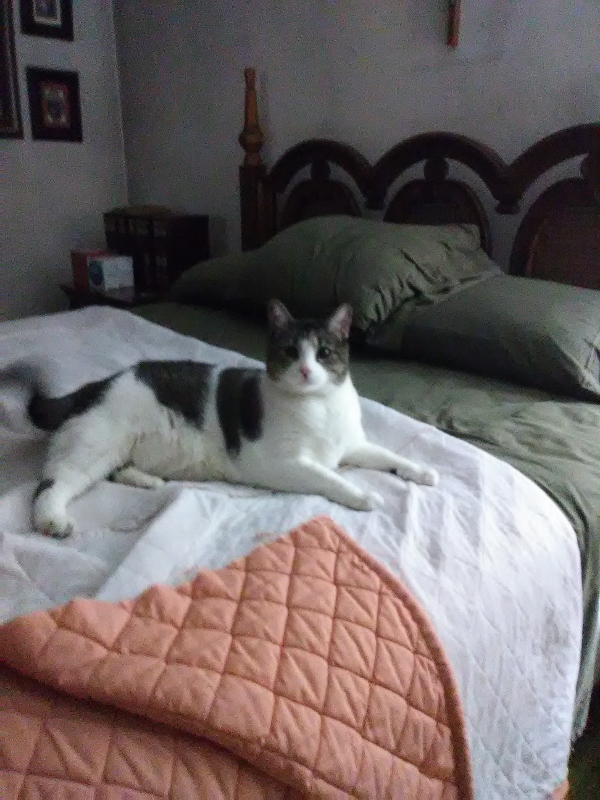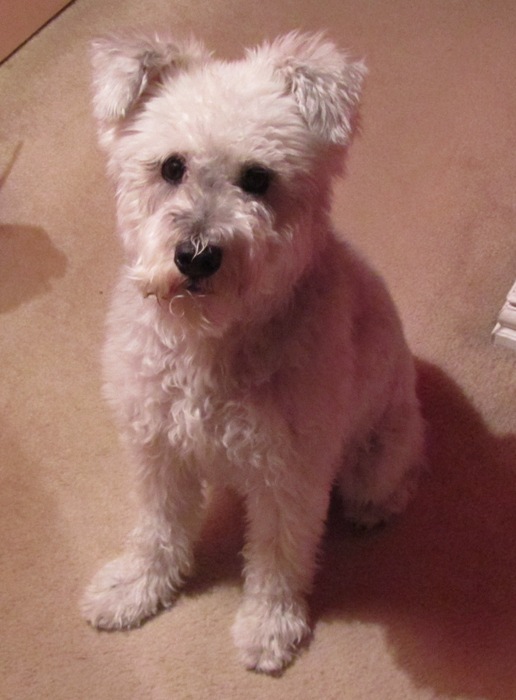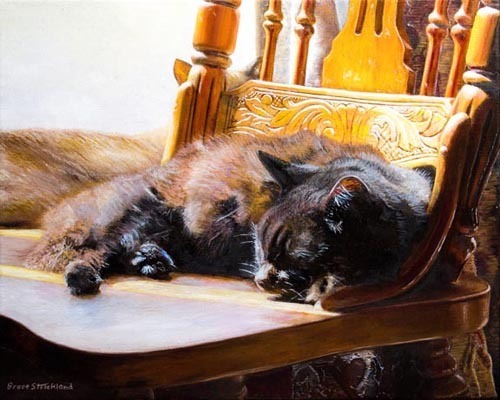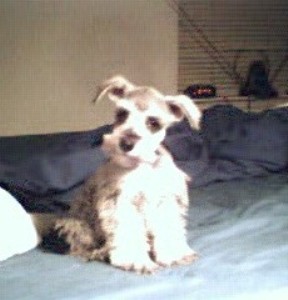
“Are you girls okay?” Giselle propped her arms on her hips and cocked her head.
The girls – Joy and Jasmine – had been acting more peculiar than usual all week long. Cats were the oddest of creatures, Giselle reminded herself; her Siamese twins being no exception.
Joy and Jasmine often perched their wiry, milky-white frames atop something – the antique dresser, the entertainment center, or the highest shelf in the den where they were now – whenever they wanted to be alone. Like all the cats she’d had in the past, Giselle knew feline personalities could be as fickle as they could be subdued.
Yet, as she stood in the den, staring up at her adopted children, Giselle noted – once again – that they appeared to be more intellectual than she previously thought was normal, or even possible. Their eyes, the bluest she’d ever seen on anyone (human or animal), gave the impression they were actually thinking; they seemed to possess some degree of cognitive function. But she always got the feeling the cats were waiting for something. Or, someone.
Then it dawned on her. They missed Robert. They were his babies, too. He’d been out of town for three weeks; this being the last phase of a year-long project for the engineering firm.
“Daddy will be home tomorrow night,” said Giselle, her hands clasped in front of her.
The girls remained still on the top shelf of the built-in bookcase, like a pair of porcelain antiques; identical and priceless, stoically beautiful, the perfect accoutrements to the array of chintz pillows and terracotta statuettes Giselle had scattered throughout their newly-purchased home.
But, yes, Giselle thought, they missed Robert. “Okay then,” she said with a skewered grin. “I’ll be going to bed in a few minutes.”
She turned off the two lamps in the den and gave Joy and Jasmine one final, loving glance. Their eyes glowed softly, a quartet of azure orbs.
The house sat at the end of a short road, backing up against a tree-cluttered mound, which tumbled down into a shallow stream and back up towards an old farm-to-market road. A four-bedroom ranch-style abode with a driveway that snaked around a thick magnolia tree to the garage had stood vacant for almost four years, the realtor, Carlene, had told them; since it was in such an odd location. The couple who’d owned it previously had suddenly left, and the county had trouble locating them. “They split up,” Carlene added, “and moved to two different states. I think the IRS was after them. They owed back taxes.”
Eventually, authorities found the duo. Once they’d been set up on a payment plan, a county judge appointed an independent counselor to oversee sale of the house. Carlene was merely trying to sell it and get it off the county’s hands. But it was still a gorgeous house.
Giselle and Robert Fernandez ogled at the area, able to hear the stream murmuring in the distance, and found nothing odd about it. “It’s perfect,” Giselle crooned, as Robert wrapped his beefy arms around her. They were standing on the walkway; already enchanted with the simple charm of the house and its rustic setting.
Carlene stood nearby, beaming with shared happiness; her petite frame perched atop a pair of shoes with excessively high heels. “Oh, I’m so glad ya’ two like it!” Her southern drawl poured over them like honey mixed with syrup and brown sugar.
That’s when Giselle first saw the cats; Siamese cats – almost identical. They sat alongside the driveway, side-by-side and partially obscured by the magnolia tree. They seemed to be looking at her, and Giselle’s heart sank.
It had been almost a year since she and Robert had put down their last cat; about eight months after the other one turned up dead at the foot of their bed. Not a good way to start a Monday morning. They had already begun their house hunt – and vowed not to get anymore pets for a while.
A while arrived sooner than expected. The cats kept showing up near the driveway. Giselle tried several times to entice them to come with her. But, each time, they’d scamper towards the rear of the house.
Then, one Saturday afternoon, Robert came back from a jog around the neighborhood, and the cats followed him to the front door. They looked more haggard than before. With a mild beckoning flip of his hand, Robert got them to go into the house ahead of him.
They managed to give the cats a quick bath – without getting scratched or bitten; an oddity unto itself, Giselle mused, knowing felines and water don’t mix well. They gave the scrawny duo some milk and sat back to discuss what to do next. Call the city pound? A local animal shelter? Giselle was more ready to give them up than Robert. They had too much to do with the house, she reiterated.
Then, for no particular reason, he abruptly named them Joy and Jasmine. From a distance, they truly looked like twins. But Joy’s ears were darker; the only real way to tell them apart. Joy was also somewhat more aggressive. But their quirky, unimposing personalities worked their way into the young couple’s hearts, and – as unexpected as the adoption was – they didn’t mind. And they decided not to give them up.
Amidst their chaotic schedules with work and refurbishing the house, Giselle and Robert made the time to take the girls to a local veterinarian to get some basic, necessary shots. A short time later, they had the cats neutered by the same veterinarian. The doctor noticed one curious thing, though; she couldn’t determine how old the cats were.
“Their teeth make them look to be about 10,” she said. “But, physiologically, they’re around 5 or 6. They don’t have any signs of arthritis or heart trouble.” She just couldn’t understand how they were each about ten years of age, yet “not show it on the inside.”
Joy and Jasmine quickly became fond of Robert, lounging on either side of him the few times he sat on the couch to watch TV, or cuddled up at the foot of the bed – closer to him. Giselle didn’t feel ignored. She was glad to get some stray animals off the street and give them a good home.
Occasionally, however, the girls displayed their aloofness by climbing atop something and remaining there for the longest time. Just like they were doing now.
Giselle carried a glass of water into the bedroom and took a shower. After smothering her body in lotion, she donned an oversized Dallas Cowboys tee shirt and was leaning over the bathroom sink, trying to pluck a renegade eyelash from her left eye, when the bedroom lights flickered and then, shut off. They came back on within seconds.
She waited a moment, but nothing happened. The bedroom lamps had been doing that a lot recently. At night Giselle would be in the bathroom or the closet – and, on one occasion, sitting up in bed reading – when the lights shuddered and then went out. But they always came back on immediately afterwards.
She stood poised over the sink, though; wondering if someone had broken into the house. She searched the bathroom for a makeshift weapon and found it in the form of a heavy shampoo bottle. Only then did she realize that the bathroom light was still on, while the rest of the house was dark. She didn’t want to ponder that curiosity any longer, so she turned off the bathroom light and inched her tiny frame into the bedroom; one hand clutching the shampoo bottle.
Something else came to mind. Then she heard that sound. Distant – giggling. She crept to a window behind a nightstand. She didn’t want to turn off the lamp or stand in front of it. She could hear them – right outside the house. Little kids giggling.
She was certain they were the neighbor’s children; a quartet of rug-rats who stormed through the area like rabid squirrels. Other neighbors had complained about them.
Why they’d be running around outside at night was beyond Giselle’s comprehension. “Do you hear that?” she asked Robert one night.
He listened. “Um…no.”
“That laughing. Little kids laughing. They’re sneaking around outside.”
“At this time of night?”
“Yes!”
Robert usually had good hearing, but he never heard those kids running around outside in the middle of the night. Joy and Jasmine could surely hear them, Giselle thought. They always disappeared somewhere into the house at night; especially when the kids started their nocturnal excursions. Maybe the kids had found the cats at one point a while back, Giselle surmised, and tortured them. When her younger brother kicked a neighbor’s dog, Giselle – age 12 and all of 4’0” – smacked his face hard enough to make him cry and bleed at the same time. Whenever she heard the neighbors’ kids bouncing around outside late at night, she clenched her hands; certain the vermin had harmed Joy and Jasmine at some point. It’s why the cats had grown desperate to get into the house, Giselle told herself, knowing they’d be safe.
When she saw the neighbors leaving one Saturday afternoon, Giselle – crouched before a flower bed, potting soil spread almost to her elbows – scoured at them. They didn’t notice her – thankfully; or they’d see the daggers flying from her eyes. The elderly lady who lived across the street with her invalid husband – the first people in the neighborhood Giselle and Robert came to know – also happened to be in her own front yard, clutching a water hose and gazing at the family of six. The elderly couple were the only people who conversed with Giselle and Robert for any considerable length. Other neighbors weren’t so loquacious; nothing beyond a wave, perhaps followed with a ‘hello.’
Giselle turned back to the flower bed she was hoping to resuscitate. “Little fuckers,” she muttered into the dirt. She thought of her girls again. How dare you hurt them!
She began moving towards the bed, when a thick mat of fur scraped against her ankles. “Oh, God!” The shampoo bottle fell to the floor.
The bedroom lights suddenly came on again, startling her again. She returned the shampoo to its place in the shower stall and started looking for the girls. She called for them. The house was silent. As she came to the end of the hallway, something else brushed against her; coming from either side. She hopped back with a sharp scream. “Goddammit!” She retreated to the bedroom, certain someone else was in the house, and crept back into the hall with a baseball bat.
A faint, high-pitched noise made her look down. Joy and Jasmine stood a few feet away. “Oh, God!” Giselle moaned, her shoulders dropping as she exhaled. “Girls.” She caressed their heads; knowing the cats were still growing accustomed to the house. She couldn’t get mad at them; she certainly couldn’t blame them for her overreactions. She laughed, as she dropped the bat back into the closet.
She glanced back down the hall. They’d disappeared again. Where was their hiding place? She grinned. Anywhere! She laughed aloud at her own anxiety and returned to bed.

Seeing Robert sitting with the girls in his lap was as pleasant to Giselle as it was curious. He kept staring into their eyes, and – from what Giselle could tell – they were gazing back. His lips would move at times. Giselle couldn’t hear what he was saying, but felt he must be reassuring the girls they were safe in this house.
“That patch of grass is dead,” Robert said. He and Giselle stood in the back yard late one Sunday afternoon.
She could still smell the wood of the newly-erected, eight-foot-high fence. For weeks Robert would come out there and stand in this one spot, just staring at the ground. She’d be busy with the rest of the yard, when she’d catch him towering over that one area.
He was right, though. Amidst the expanse of vibrant green grass, this one small patch towards the back of the yard stood out because of its beige coloring. It looked as if some alien beings had descended upon the property and began carving out crop circles, before realizing they wouldn’t have enough room.
Giselle looked at Robert. He seemed more upset by it. Not just annoyed, she thought, but…disturbed.
“Well,” he finally said. “I guess I’ll just have to dig it up and plant some new grass.” He had just finished mowing the lawn and was tired.
But he was back outside the following evening, again standing over that one brown-grass area. Just staring at it. Occasionally picking at it with a hand, or rubbing his toes against it. Wandering around it, cocking his head in different directions; like a puppy inspecting a new toy.
“Just replace it,” Giselle said one evening, after Robert had come back inside.
“Yeah, I will.” He took a sip of water and mumbled, “When it’s time.” He headed towards the bedroom.
“‘When it’s time’?” Giselle repeated.
“You’re both so pretty,” she heard Robert say. He sat in the den, the cats in his lap. Giselle wasn’t really listening, but she suddenly could hear him. “You’re okay. You’re safe here with us.”
Giselle grinned. Just as she suspected.
“You’ll always be safe,” Robert continued. “No one can ever hurt you again.”
On the following Saturday she stood in the utility room, sorting through laundry, when Robert entered. She didn’t hear him; the steady hum of the dryer being so abrasively loud. He’d been fidgeting with his laptop. “Oh hey, babe,” she said.
He almost bumped into her – as if she wasn’t there – and entered the garage.
It was so unlike him that Giselle couldn’t say anything. She watched from the doorway as Robert grabbed a ladder and proceeded up into the attic. It was only accessible through a square opening near the door. Robert propped the ladder against the wall, again seemingly oblivious to her presence on the other side of the metallic apparatus. “What – ?” she started to ask.
She could hear him in the attic space just above the utility room; rumbling around with the gracefulness of a giant boar. “What are you doing?” she asked into the ceiling. She noticed Joy and Jasmine perched at the opposite end of the utility room, closer to the kitchen.
A few moments later Robert ambled back down the ladder; carefully balancing himself while cradling a beige shoe box under one arm. He dropped it on the floor and replaced the ladder. He swept up the box, as he reentered the utility room – again seeming to ignore his wife – and sat down at the kitchen table.
The cats had left.
“What is this?” Giselle asked, pointing to the box.
“I – uh – I don’t know, really,” he replied with a smile. He had removed the lid and was rummaging through its meager contents. “I just had an idea to look up there.”
“Why?”
“I – don’t know. I just did.”
The box bore a few photographs and a handful of papers; the latter yellow and crinkled.
Giselle and Robert sifted through the single stack of photos – all five of them. One had a group of children gathered on a patio; another displayed the kids on a couch; one featured two little girls wearing identical dresses standing against a fence; one had a blurry image of a smiling young woman, captured as if she was in mid-stride, her over-sized sunglasses creating heavy shadows on her face; and the last showed a man and a woman standing beside a pick-up truck in a driveway.
“Who are these people?” Giselle asked.
“I don’t know,” Robert mumbled.
The handwriting on the papers was too faint and illegible to comprehend.
Robert continued flipping through the pictures – over and over – for several minutes, as if hoping to find some new detail.
His intensity began to annoy Giselle. “So…what’s this all about?”
He kept perusing the photos and looking at the papers.
“Robert?”
“Yeah.”
She tilted her head forward, closer to his face. “What is this?”
He sighed. “I don’t know.”
“How did you know this stuff was here?”
He sighed again; a sound more of empathy than frustration. “I…I don’t know. I just had the idea to look up there. I didn’t – I didn’t know this stuff was there.” He kept shaking his head, as if uncertain of his own actions. “Weird,” he finally said, packing everything back into the box. He dropped a light kiss onto her cheek, before leaving with the box.
Giselle started after him and stopped when she heard the girls scuttle past. She barely caught a glimpse of their tails, as they took off in the same direction as Robert. Their sudden presence startled her. She fidgeted her fingertips together, listening to the dryer hum.
On Sunday night Giselle drove Robert back to the airport for another business trip; this one scheduled to last only three days. The following evening she busied herself with a few crossword puzzles and finally completed an aging history book that she’d actually first tried to read in college. She placed the dusty tome back on a shelf and was surprised to see the girls when she turned around. “Hey, girls!” she said with a smile. She squatted down to caress their heads. Their fur felt unusually cool. “Are you okay?”
They didn’t answer her; they were just enjoying the massage.
Her phone rang. It was Robert. “Hey, babe.”
“Hey, how’s it going?”
“Good! How are things there?”
“Eh – kind of gloomy. It’s been threatening to rain since last night. But it’s just been cool and windy.”
“Oh, well –”
“Listen, can you do me a favor? Not right now – it’s too dark outside.”
“Uh – yeah, sure.”
“Can you check out in the back yard and look at the spot where the grass is brown. You know that one little area closer to the back side of the fence?”
“Uh – yes. Why?”
“Can you just check and see if there’s anything odd under there?”
Odd? “Like what?”
He was silent.
“Like what?”
“Um – just – uh – just see if the ground feels funny.”
See if the ground feels funny? “What do you mean?”
“Um – I don’t know.”
“Okay…I still don’t know what you’re saying. What – what’s with the ground out there? What do you mean ‘feels funny’?”
“I don’t know. Just – uh – just see if there’s like a bump of some kind right underneath that piece of grass.”
“Okay,” she muttered after a second.
“I keep thinking there’s a tree stump buried there. You know – maybe the previous owners had cut down a tree and didn’t really remove the stump.”
“Oh, okay.” That actually makes sense, she mused. “I guess that could be dangerous, huh?”
“Yeah, it could.”
They both relaxed and talked a little more. He told her he was lounging on the bed in his hotel room, butt naked with a steely erection; thinking about her. He just wanted to get the “funny ground” issue out of the way first.
She wanted to start up on another book, as she dropped into bed, but decided against it. She had a meeting at 8:30 the following morning. But, as she lay in bed, staring at the crown molding and the ceiling fan, she couldn’t help but think of Robert’s curious request. ‘Feels funny’? What the hell was that all about? Joy and Jasmine had curled up at the foot of the bed; an unusual spot for them, considering Robert wasn’t here.
Then she heard a faint giggle pipe through the bedroom window. “Oh, goddammit!” She sat up, staring hard at the drapes. She heard another one and yet another; finally leaping out of bed and turning on the side lamp almost simultaneously. “Stupid kids!” She peeked out of through one side of the drapes, enough to see out towards the neighbor’s house, but not enough to be seen.
Nothing. The neighbor’s bushes languished in a deep shade of blue.
She turned to shut off the light – bypassing the empty bed – and stepped back to the window. Even with the bedroom darkened, nothing outside the house caught her attention. She switched the lamp back on, smirked at the empty bed and sauntered into the bathroom.
The lamp shut off.
She dropped her shoulders with an exaggerated sigh. The lamp had been functioning oddly. It wasn’t the light bulb: she’d checked that more than once.
The light came back on.
A few moments later, she stood at the sink, patting her hands dry and wondered if the sudden irritation in her left eye was a lash. She leaned forward, towards the mirror.
The bedroom went dark.
She slowly lowered her hand, keeping her gaze on the mass of darkness behind her; framed only by the bathroom doorway. She felt a coldness roll up her back and onto her shoulders. This wasn’t the neighbor kids running around outside acting stupid. Someone had entered the house, she thought.
Again, she searched for a makeshift weapon and found it in one of her combs. She crept back into the bedroom and looked down the hall. She suspected for a moment the power had gone out. But the bathroom light was still on. She proceeded to the closet and grabbed a baseball bat; tossing the comb onto the bed. She would have picked up one of Robert’s shotguns perched in the back of the closet, but she didn’t know if it was loaded and didn’t care to take time to find out.
She moved down the hall and reached for the light switch. The light wouldn’t come on. A shuffling noise a few feet away prompted her to search briefly for the cats. She tried the light switch again, and the hall lamp illuminated.
Enough to catch something dart passed her.
Enough to make her stop blinking and breathing for a few seconds. The light shut off. She flicked the switch several more times, but the hall remained dark.
She finally took a deep breath and cocked her head towards the ceiling. “Damnit!” she muttered, wondering how she must look – standing in a darkened hallway of her own home, wearing an oversized Dallas Cowboys tee shirt and holding a baseball bat. She moved into the front room, just a few feet from the main entrance.
The hall light re-illuminated.
She glanced over her shoulder; curiosity mixed with frustration. She turned on a lamp in the den and scanned the quiet area. When she wheeled back around, Joy and Jasmine sat in the middle of the hall. “Well…there you two are.”
They cocked their heads, as if they didn’t know why she was surprised. Or pretending not to know.
Once back in her bedroom, Giselle dropped the baseball bat into the closet. The girls curled beside one another at the foot of the bed, forming something of a crescent shape. Giselle slowly climbed back into bed and turned off the side lamp; making only a quick note that the bathroom light had already been turned off.
When Robert returned home, Joy and Jasmine couldn’t stay away from him.
Giselle approached the three of them, as they sat on an easy chair. “Well, look who’s become daddy’s girls.” She reached out to tickle the cats’ ears. They snarled at her, causing Giselle’s entire arm to snap back into her torso, like a measuring tape being recoiled. She stood up straight, her mouth contorted in both shock and annoyance. “What the hell!”
Robert – who had been staring at the girls all this time – merely threw an equally irksome glance at his wife. That evening he hovered around the brownish patch of grass in the back yard for several minutes. Giselle could only stand at a kitchen window and try to make sense of his behavior.
Then the girls suddenly darted towards him; coming from somewhere near the house. Their abrupt presence – outside, of all places – startled Giselle. The cats hadn’t been outside the house since she and Robert had taken them in – at least not by themselves. They didn’t want to take the chance the girls would become feral again and end up lost or, worse, in the hands of some wicked children. Like the kids next door.
She started towards the door, but returned to the window. The girls had trotted up to Robert and started trolling that same patch of brown grass. He squatted down to caress their heads. She saw his lips moving. Although their backs were to her, Giselle could tell the cats were listening to Robert. He then began running his hands along the brownish grass, before caressing the girls’ heads and talking to them again. It looked like he was saying more to them than to Giselle in the two days he’d been home.
He finally stood and marched back into the house. He went directly to the office. Giselle followed him and was surprised to see him rifling through that dusty shoe box. “Robert…what’s going on?”
“Something.”
“What?”
“Just something.” He fiddled through the pictures. “Here,” he muttered, more to himself. “Here they are.”
“Who?”
He dropped the pictures and strode back into the garage, almost brushing against Giselle.
“What – ?! Robert!” Only when she arrived in the garage did she realize the girls hadn’t followed him into the house. “Wait a minute. Where are the – ? Where are Joy and Jasmine?”
Robert stripped off his tee shirt, grabbed a drain spade shovel and hurried back outside. Again, Giselle followed him, but she stopped just outside the patio. He proceeded to that brown patch of grass and began digging.
“What – ?” She sighed loudly, but it dissipated into a heavy wind. “Robert!”
He repeatedly slammed the shovel into the grass and, within minutes, had dug it up. He kept digging, his torso and face already coated in sweat.
Giselle casually approached and began circling him the way she’d done when they first met at that July 4th barbecue. All the other women had sauntered past him, trying to get his attention, as he talked with two other men. Robert was the best-looking man at the party, and Giselle immediately became determined to meet him. Her ploy had worked. He stopped talking to his friends – one of whom was the host – and smiled awkwardly at her.
This time, though, her circling movements went completely unnoticed. “Robert,” she said gently.
He kept slamming the spade into the dirt. A small mound had begun to form to his left; something like a newborn island volcano breaking the ocean’s surface.
“Robert.”
He kept digging. His gray khaki shorts had darkened with sweat.
“Robert!”
“What?!” He stopped, still breathing heavily, and looked at her.
“What in God’s name are you doing?!”
“I’m trying to find them!” He plunged the spade back into the small hole he’d created and pulled up more dirt.
“Find what?”
He kept digging; the mound growing higher; his breathing growing even heavier.
The sun had started to drop below the mass of trees behind the house. The modest blue of the sky metamorphosed into a deep purple, and the light breezes turned into a steady wind.
Robert continued angrily slamming the shovel into the dirt. And, just as Giselle was about to speak his name again, they heard a loud crack. A near-splintering of wood. The shovel had hit something harder than dirt. “Oh God,” Robert muttered. He moved some dirt with the shovel; more cautious now.
Giselle stepped forward, as Robert tossed the spade off to one side and squatted down. His eyes remain transfixed on the hole. And what was in it. Giselle leaned over, as Robert cleared away more dirt.
The shovel had struck an object, and as Robert dug more hurriedly – this time with his hands – she realized it was a box. A wooden box.
Finally, Robert was able to free the box. He tried picking it up, but it was either too heavy or it was stuck. As he strained his arms, the carotid arteries of his neck bulging with aggravation, the top of the box suddenly bolted loose. Robert tumbled backwards. The gritty wooden top rolled out of his hands and over the spade. He crouched back over the hole and paused for a moment; hot breaths spilling from his mouth.
Giselle looked down, her body trembling. The wind had intensified slightly, and she was getting cold.
The sky was the darkest shade of violet she’d ever seen.
A dirty cloth or sheet was stretched over the box.
Robert gently reached down and pulled it up.
Giselle heard the cats screech and whipped her head around. She didn’t see them. “Where are they?” she asked, partly to Robert and partly to the wind. “Where’d the girls go?”
Robert’s breathing had slowed. “Here,” he said.
“What? Where?”
He pointed to the box.
She peered down into it.
“They’re here,” he muttered. He loosely gestured to the bones in the box, still not looking at Giselle.
She felt colder, as she noticed two tiny human skulls.
“They’re here,” Robert murmured, breathing normally now. “They’re right here.”

© 2016



























